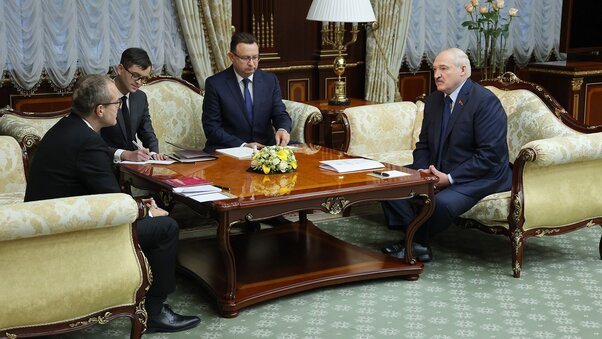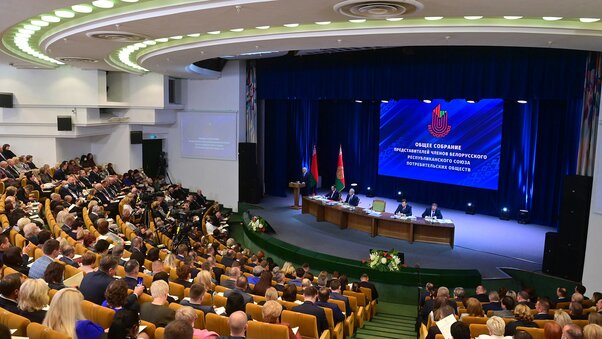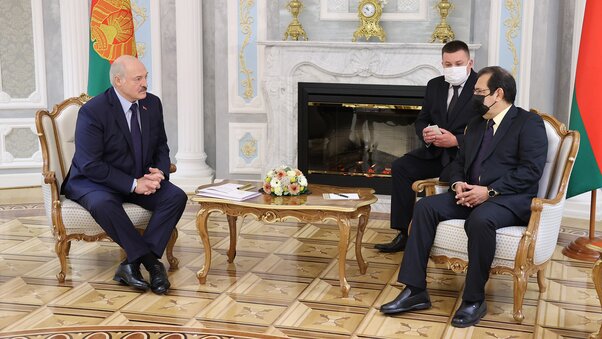Meeting with Russia’s Prosecutor-General Igor Krasnov
- 8
- 6:48
Belarusian President Aleksandr Lukashenko met with Russia’s Prosecutor-General Igor Krasnov on 28 October.
“Since the very first steps during this visit to Minsk you have felt that we are not strangers. However, I noticed that mass media have been recently trying to drive a wedge between us. We are experienced people, especially you, as you have seen a lot in life because of your profession. Probably, you understand what is going on around us. Therefore, we cannot escape this political entourage. Nevertheless, I would like to emphasized once again that Belarus is not an alien country for you. It’s like a home for you. And you should act accordingly,” the head of state said at the beginning of the meeting.
“This meeting is taking place in the run-up to the very important event. We will hold the session of the Supreme State Council on 4 November,” the President said. “This is a crucial summit because we are making a resolute step in our integration in the past 15 years,” the Belarusian leader stressed.
“As President Putin, my counterpart, said, this is how we will resolve many, if not all, issues in the economy. In his words, we are building the foundation of our future relations. I think that these relations will be productive. I hope that we will make a concrete and powerful step,” Aleksandr Lukashenko said.
At the forthcoming session of the Supreme State Council the two leaders agreed to sign 28 Union State programs. According to the President, some people might say that Belarus and Russia are doing that because “they have nowhere else to go”. The two countries have been dealing with sanctions, and Belarus has only one ally. “The work [on the Union State programs] was started long before those events here, and in Russia, before these sanctions,” the head of state said. “Probably, we have seen once again who our friends are, who our rivals are, who our real enemies are. We see all that. I think that new facts will be unveiled every day.”
During the meeting Aleksandr Lukashenko commented on the ongoing militarization along the western borders of Belarus.
"Here’s the latest news. Russia has probably paid attention to it too. Poland decided to fight illegal migration on the border with Belarus with the help of Leopard tanks. You'd probably be surprised by that. Are they going to use tanks against civilians? They are just looking for any excuse to move their troops closer to our borders, the borders of the Union State. We see all this and, of course, our reaction will be very harsh. We'll wait a while. We will warn them. Belarus has something to move closer to the borders, let alone the Russian Federation. We will act harshly, disregarding any criticism from their side," the head of state said.
Aleksandr Lukashenko asked Russia to join the efforts to investigate the genocide that took place during the Great Patriotic War.
“You know that we have launched a massive effort to achieve recognition of the genocide of the Belarusian and Soviet people in the territory of Belarus during the Great Patriotic War. Large-scale work is underway at the suggestion of the prosecutor general. I know that Russians always help and support us whenever we ask them. I have a personal request for you: could you join this effort if you have a slightest opportunity? I think we will go further than Belarus in this. We have something to say and show about the events happening in the territory up to the Urals. Stalingrad, the area near Moscow, Leningrad. A real genocide,” the Belarusian leader said.
“We must keep working on it in order to show all these vile and filthy people what role the Soviet people played during the Second World War, the Great Patriotic War, defending their sovereignty, security and human rights and freedoms as they call them today,” Aleksandr Lukashenko said.
Speaking about the cooperation between the prosecutor general's offices of Belarus and Russia, the President noted that it has always been smooth. “There are enough crooks both in Belarus and Russia. And as the prosecutor general has told me, there have never been problems during the joint fight against them. I want to assure you: no problems will emerge from our side. My involvement is not even needed here. The prosecutor general will resolve any issues related to the fight against crime committed by Russians in the territory of Belarus and by Belarusians in the territory of Russia. We have no problems here due to our agreements, arrangements and your contacts. We are able to resolve all issues. I assure you once again,” the head of state said.
“If you have any problems now or in the future, do not hesitate to let us know about them. I would like to emphasize once again that we are kith and kin, we have common tasks and we should address them together,” the President added.
Igor Krasnov thanked Aleksandr Lukashenko for hosting him. “With no other prosecutor general's offices in the world does the Russian Prosecutor’s Office cooperate as closely as with prosecutors of Belarus. Every year we compare notes with the prosecutor general of the Republic of Belarus taking into account the international and regional agenda, and we outline priority areas of our work for the near future”, he stated.
According to him, the common tasks are addressed, among other things, thanks to the joint collegium of the prosecutor generals’ offices of Russia and Belarus created within the framework of the Union State. “This collegium discusses various issues related to protection of business, countering cybercrime and drug trafficking,” Igor Krasnov said.
“Today, external attempts to destabilize the situation in Russia and Belarus are of particular mutual concern. This is done using, inter alia, extremist and terrorist groups. This situation became particularly alarming in connection with the current developments in Afghanistan. We should overhaul our security policies throughout the CIS,” the prosecutor general emphasized.
Prosecutors will also focus on observance of the rights and freedoms of the most vulnerable population groups, environmental conservation, and efforts to combat corruption, domestic violence and crimes against children.


